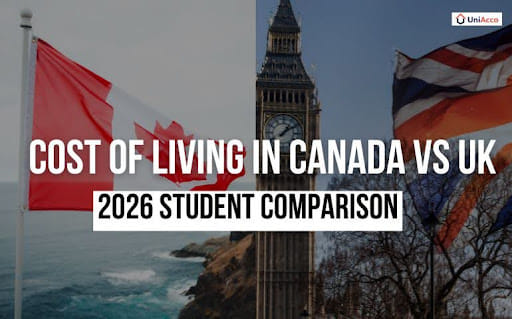Pursuing an MBBS degree is a big step for many future doctors. Deciding between studying in India or abroad can be tough. You should know that in India, the competition is intense. About 18 lakh candidates are competing for roughly 84,000 seats in medical colleges for the 2025 academic year. This means there are nearly 23 candidates for each seat. Many foreign medical universities offer lower tuition fees and an easier admission process.
These universities are attractive options for students who want quality education without the high costs of private institutions in India. In 2025, the cost of pursuing an MBBS degree overseas may range from INR 15 to 50 lakhs, depending on the country and educational institution.
This blog will compare studying for an MBBS in India vs abroad.
Key Takeaways
- Competition in India is intense. Around 18 lakh candidates compete for about 84,000 seats in Indian medical colleges. That’s nearly 23 candidates for each seat.
- Studying abroad can be easier and cheaper. Many foreign medical universities have lower tuition fees and simpler admission processes than Indian private institutions. The cost for an MBBS abroad ranges from INR 15 to 50 lakhs. It varies by country and institution.
- In India, the NEET exam is mandatory for all medical colleges. Abroad, entrance exam requirements differ by country. To be able to practise in India, graduates are required to pass the FMGE. Foreign institutions need accreditation from NMC, WHO, and other relevant bodies for recognition.
MBBS Eligibility For India Vs. International
Deciding to pursue an MBBS degree depends on eligibility criteria. These criteria vary between institutions in India and those abroad. Both paths have unique advantages. Prospective medical students need to understand the specific requirements. Here’s a table comparing the eligibility criteria for MBBS in India and abroad, highlighting the key differences.
| Criteria | MBBS in India | MBBS Abroad |
| Age Limit | Applicants must be at least 17 years old by December 31 of the year they seek admission. | Applicants must be at least 17 years old by December 31 of the year they seek admission. |
| Educational Qualification | Achieving a passing grade in Class 12 with a curriculum encompassing Physics, Chemistry, Biology, and English. | Achieving a successful outcome in Class 12 with a curriculum encompassing Physics, Chemistry, Biology, and English. |
| Percentage Cut Off | In the general category, students must achieve a minimum aggregate of 50% in Physics, Chemistry, and Biology (PCB). In comparison, SC/ST/OBC students must obtain a minimum of 40% in the same subjects. | The overall score in Physics, Chemistry, and Biology (which may differ by country) is 50%. |
| Entrance Exam | It is compulsory to take the NEET (National Eligibility cum Entrance Test). | In some countries, NEET is mandatory, while others may require additional exams such as TOEFL or IELTS. |
| Course Length | 5.5 years, which includes internship. | The duration ranges from 5 to 6 years, with variations depending on the country. |
| Recognition | Only institutions recognised by the MCI are accepted. | Institutions must be accredited by NMC, WHO, and other pertinent organisations for recognition. |
| Course Schedule | Practice in India does not necessitate any further screening tests. | To be eligible to practise medicine in India after completing their studies, graduates must pass the Foreign Medical Graduate Examination (FMGE). |
Comparing MBBS Entrance Exams: India Vs Abroad
The entrance examination requirements for admission into MBBS programmes vary between India and other countries worldwide. In India, NEET is the only entrance exam for all medical colleges. This includes both government and private institutions. For MBBS abroad, the entrance exam depends on the country.
Different countries have varying requirements for medical school admissions, with some mandating the NEET exam and others administering their entrance exams. Aspiring medical students should research the specific entrance exam requirements for their chosen country and university.
- India MBBS – To study MBBS in India, students must pass the NEET exam to be admitted into medical colleges. This rule applies to both government and private institutions.
- MBBS Abroad – The entrance exam depends on the country. For Nepal, it’s NEET. For Kazakhstan, it’s NEXT. The MCAT is the standardised test used in both the United States and Canada for medical school admissions. In the UK, it’s the UCAT.
MBBS India Vs Abroad: A Financial Breakdown
Pursuing an MBBS degree is a crucial decision for aspiring medical students. A key decision is whether to pursue education in India or study overseas. Cost, quality of education, and admission criteria are key factors. This comparison will help you understand the financial aspects of studying MBBS in India versus studying abroad. It aims to give a clearer picture for students making this important decision.
| Parameter | MBBS in India | MBBS Abroad |
| Tuition Fees | Public universities: Tuition fees range from INR 15,000 to INR 89,500 annually. The cost of attending a private university can vary from INR 8 to INR 25 lakhs per year. | The entire program’s cost ranges from INR 12 to INR 25 lakhs, depending on the country. |
| Complete Cost Involved | The overall cost of the course, including living costs, varies between INR 50 lakhs and INR 1.5 crores. | The course costs range from INR 15 to INR 30 lakhs, varying based on the country of study. |
MBBS Admissions: India Or Overseas?
The admission process for MBBS varies greatly between studying in India and abroad. In India, the National Eligibility Entrance Test (NEET) is the only exam accepted by all public and private medical colleges. Admission is given through a centralised counselling process based on NEET scores and reservation categories.
The admission process for MBBS abroad is different in each country. Most countries require international students to take their entrance exams along with NEET. The specific eligibility criteria, application process, and required documents change depending on the country and university.
When you want to pursue an MBBS degree, the documents you need can vary. They differ if you’re studying in India or going abroad. Here’s a look at what’s required for each:
| Documents Required | MBBS in India | MBBS Abroad |
| 10th Mark Sheet | Required | |
| 12th Mark Sheet | ||
| NEET Score Card | Mandatory | Mandatory for Indian students |
| Passport | Not required for admission | Required |
| Passport Size Photos | Not typically required | |
| Birth Certificate | ||
| Medical Certificate | Not Required | Required (health checkup is needed) |
| Character Certificate | Often Required | |
| Transfer Certificate | Often Required | |
| Proof of English Proficiency | Required (IELTS/TOEFL, if applicable) | |
| Police Clearance Certificate | Required for visa applications | |
| No Objection Certificate | Often Required | |
| Financial Proof | Required (bank statements, documents related to loan approval) | |
Top And Renowned MBBS Colleges For MBBS India Vs Abroad
Studying medicine holds great prestige. Aspiring doctors often struggle to choose between medical colleges in India or abroad. They consider factors like education quality, degree recognition, tuition, and living expenses. Below is a table comparing top MBBS colleges in India and abroad. It highlights their key attributes.
Top MBBS Colleges In India
| College Name | Location | Affiliation/Recognition |
| All India Institute of Medical Sciences (AIIMS) | New Delhi | NMC, WHO |
| Post Graduate Institute of Medical Education and Research (PGIMER) | Chandigarh | NMC, WHO |
| Christian Medical College (CMC) | Vellore | NMC, WHO |
| King George’s Medical University (KGMC) | Lucknow | NMC, WHO |
| Maulana Azad Medical College (MAMC) | New Delhi | NMC, WHO |
| Grant Medical College | Mumbai | NMC, WHO |
| JIPMER (Jawaharlal Institute of Postgraduate Medical Education and Research) | Puducherry | NMC, WHO |
| University College of Medical Sciences (UCMS) | New Delhi | NMC |
| Lady Hardinge Medical College | New Delhi | NMC, WHO |
| Armed Forces Medical College (AFMC) | Pune | NMC, WHO |
Top International MBBS Colleges
| College Name | Location | Affiliation/Recognition |
| Harvard University | USA | NMC, WHO |
| University of Oxford | UK | NMC, WHO |
| Stanford University | USA | NMC, WHO |
| University of Cambridge | UK | NMC, WHO |
| University of Melbourne | Australia | NMC, WHO |
| University of Toronto | Canada | NMC, WHO |
| University of Tokyo | Japan | NMC, WHO |
| Karolinska Institute | Sweden | NMC |
| National University of Singapore | Singapore | NMC, WHO |
| University of Sydney | Australia | NMC, WHO |
FAQ
1. What Are The Main Differences Between MBBS In India And Abroad?
The main differences include admission criteria, course duration, tuition fees, and licensing requirements. In India, NEET is required for admission, and the course lasts 5.5 years. Abroad, the course typically lasts six years. Tuition fees are usually lower in India. Graduates from abroad must pass the FMGE exam to practise in India.
2. Is it easier to get into medical school abroad Than In India?
No, it is not necessarily easier. NEET qualification is mandatory for Indian students seeking MBBS admission, whether in India or abroad. Admission criteria vary by country and university.
3. What Are The Advantages Of Studying MBBS Abroad?
Studying MBBS abroad offers global exposure and practical learning from experienced doctors. It often features better infrastructure and internationally recognised degrees. However, students must adapt to a new culture and language.
4. Is MBBS From Abroad Valid In India?
Yes, MBBS degrees from foreign universities are valid in India. Graduates must complete the FMGE exam to obtain a medical licence in India and work as a doctor there.
5. Can I Practise In India After MBBS Abroad?
Yes, you can practise in India after completing MBBS abroad, but you must clear the FMGE exam conducted by the National Board of Examinations (NBE).
Thank you for reading our guide to the MBBS India Vs Abroad! Let us know your top choice of university in the comments section below!















0 Comments